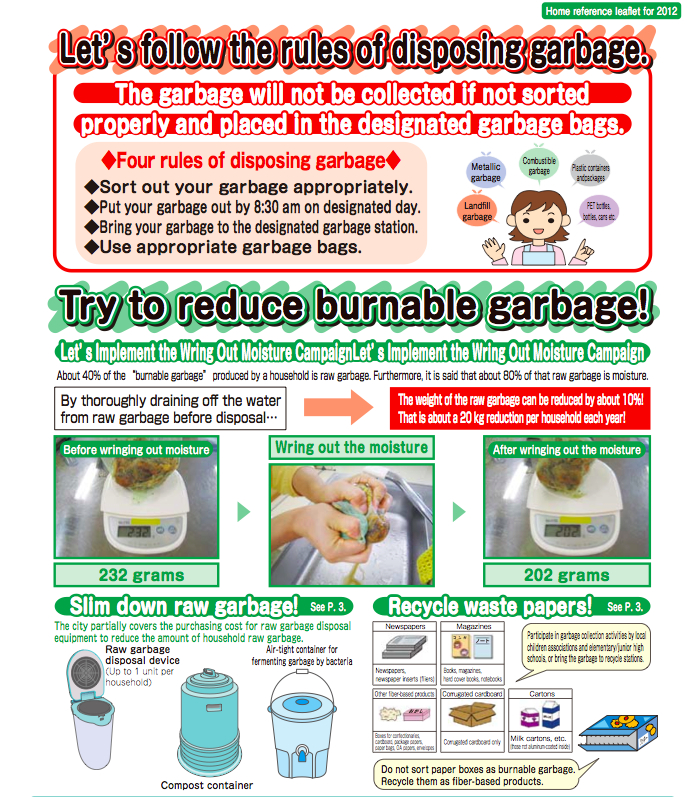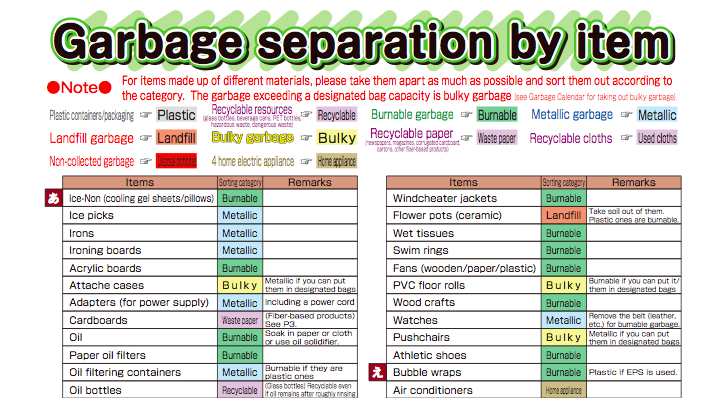In the U.S. taking out the garbage is easy. I have a bin for recycling and for regular garbage and on the assigned day of the week for my street, Monday, I pull the bins out to the curb for pick up. When I get home from work the bins are empty and I roll them back into my garage. With only one day a week with only two bins to deal with it is super simple.
When I was living in Japan it was a different story for me. In the U.S. in most areas we don't have to separate our recycling but in Japan you do. To an outsider it can be a little confusing with all the different categories and rules for sorting and disposal.
Among the expat community garbage stories abounded. There was the person who wasn't sure how to dispose of Pringles cans so he saved them in a bag and left them in the hotel room he stayed at the night before moving back to his home country. There was the person who accidentally put a fruit peel in the wrong bin at work and came back from a meeting to find that a Japanese co-worker had put it back on his desk. And of course there were several stories of people decided to ship something back home to throw away there rather than figure out how to get rid of the item in Japan.
Personally, I had a co-worker explain to me that I was throwing out my soda bottles in the wrong manner at work. First, you rinse the bottle. Then you remove the cap and label with each going in a separate bin. Finally you put the bottle in a crusher apparatus you stomp on with your foot and then place the bottle in the plastic bin. This all may seem ridiculous but until you have lived it, it is a little hard to understand how it can be that complicated.
Needless to say, when I first moved to Japan I was a bit preoccupied with my garbage. I didn't want to be the clueless foreigner who was doing it wrong not to mention that if you make a mistake they simply won't take your bag.
First you have to have the proper bags. Each town has local bags that are marked with the town name and what type of garbage should go inside. They are clear so that the contents can easily be seen and the labeling is color coded. Where I lived in Toyota City plastic went in a black bag, burnable went in a green bag and metal went in a blue bag for example. My friends who lived in Nagoya had completely different bags with different colors.
Next you have to make sure that you are putting the correct thing in the correct bag. For recylable things like paper and plastic there is a little icon printed on the item to let you know, however it was not as easy as it seems. There were a lot of unwritten rules that weren't obvious like clean paper should get recycled but if the paper was dirty it should go in the burnable bag.
With the garbage sorted you have to make sure that you put the right items out at the right time. Burnable garbage was picked up every week on Tuesday and Friday, plastic every week on Monday, metal once a month on the second Wednesday and landfill once a month on thee fourth Wednesday. For the items picked up weekly it wasn't such a big deal but trying to remember to take the monthly items out on the right day was tough. I had one bag of metal items that I missed getting out two months in a row accidently. Below is the sign posted in my local garbage pick up area indicating the dates of pickups and a few example items that go in a particular type of bag. This wasn't terribly helpful to me since I didn't need to know how to throw out plastic robots or cinder blocks. I needed more practical advice on how to throw out a milk carton. I later determined that milk cartons needed to be flattened in a specific way and turned it at a bin at the grocery store. Obviously!
Lucky for me, my drop off point for my garbage was just outside my apartment building. It was a small concrete and tiled area with a net over it to keep birds out. When I first moved to Japan I would take a look at what types of items people were putting in which types of bags so I could make sure I was getting it right.
For items that are not picked up at the drop off spots you need to take them to recycling centers. At the end of my time in Japan the larger items that would have required bulky disposal (which you have to pay for) I was able to sell or give to other expats or to sell back to a recycle shop so I didn't need to worry about it.
I took a look at the Toyota City website while writing this and found they now have a detailed list of how various items should be thrown away. They even have versions in other languages included English. I sure wish I had that while I was living there! All of my garbage questions would have been easily answered in this fourteen page document.
The first page has a landmine of information. If I had this when I was in Japan I would have known the process for throwing away my soda bottles without having my colleague needing to tell me I was doing it wrong. Also, please note the recycling mascot character in the top right. It's name is Risa which I am guessing is short for the word recycle in Japanese (pronounced risakuru). Risa also happens to be how my name is pronounced in Japanese. Coincidence, I think not...

On this page I learned that I had been completely clueless to the fact that I was supposed to be wringing out my garbage before throwing it away. On my next trip to Japan I will implement.

They are even eight pages dedicated to listing up various items and telling you which of the disposal methods you should use. The list is in order of how you would find the Japanese equivalent word in the dictionary so finding the right item is a bit tough in the English document, but this is still an awesome resource. I always wondered how you would dispose of swim rings and now I know that they are totally burnable garbage.

I've just shared a few snipets of this Japan garbage disposal instruction treasure, but if you want to check the whole document in it's glory here it is: Toyota Region Garbage Home Reference Leaflet for 2012. Looking back it makes me happy that now all I need to do this week in the U.S. is roll two bins to the curb for my garbage pick-up. I will never take my garbage pick-up for granted again!